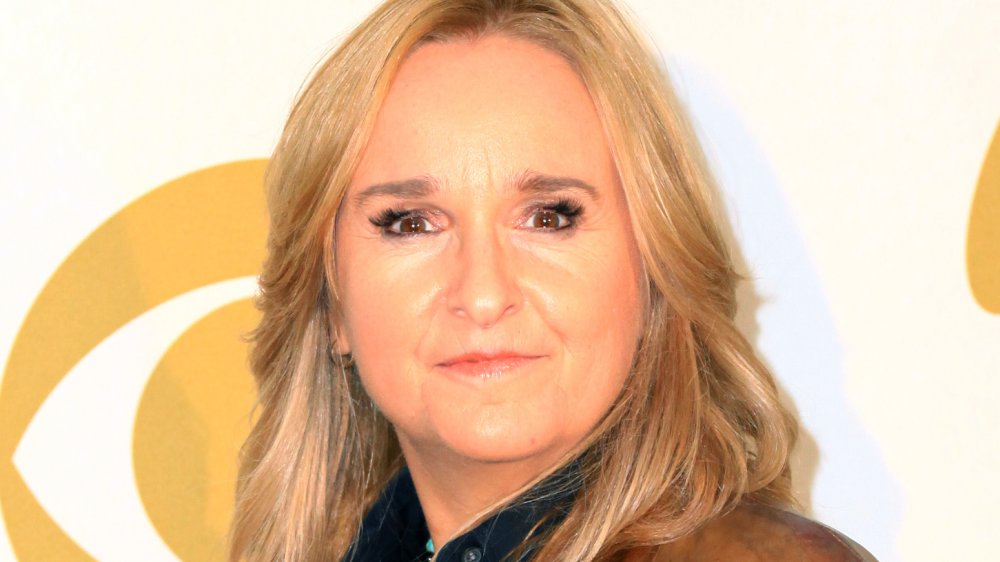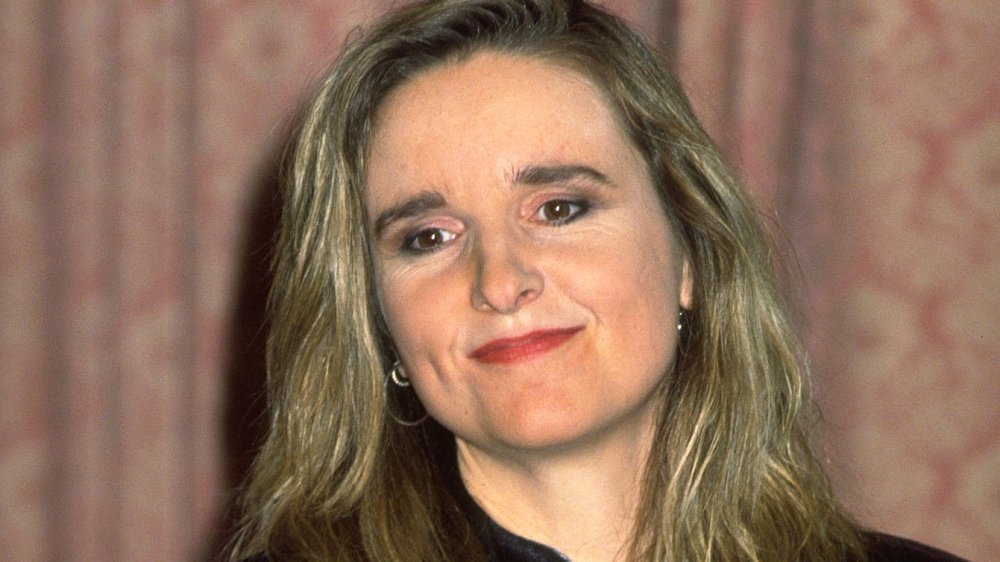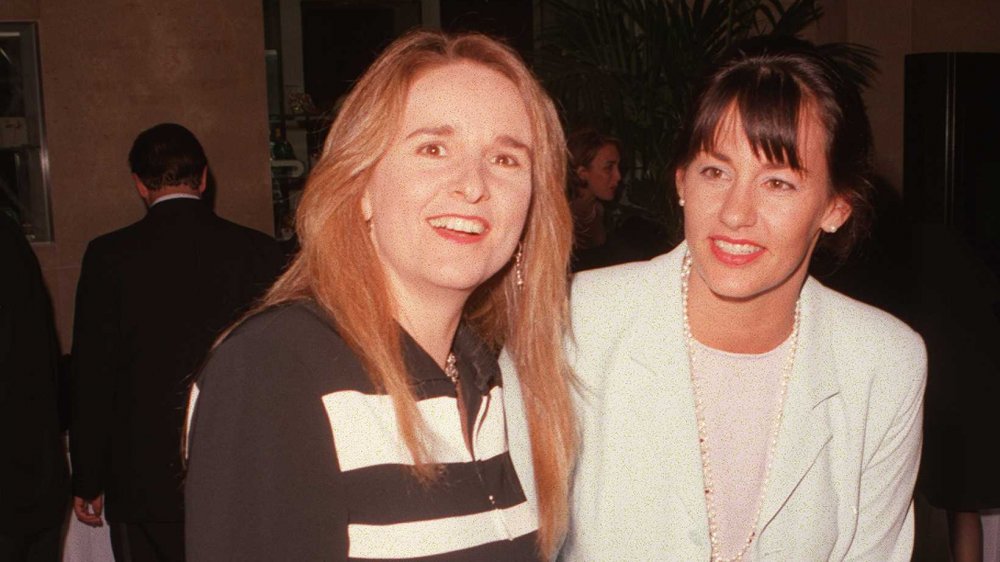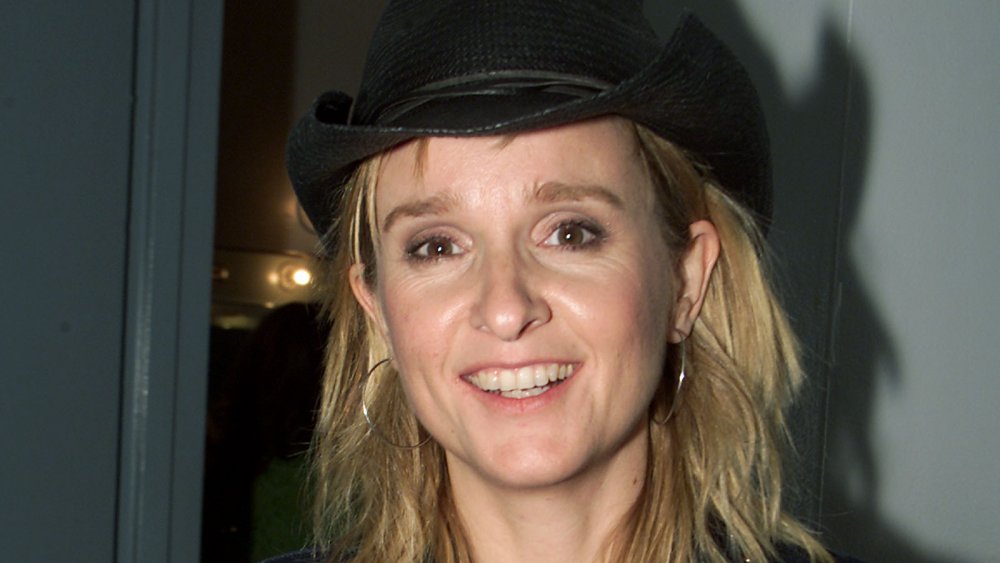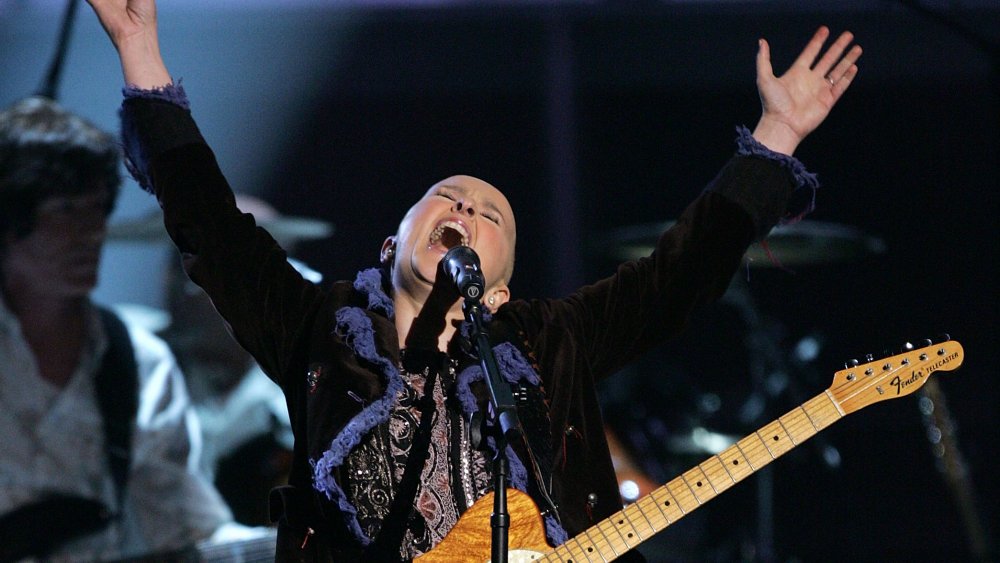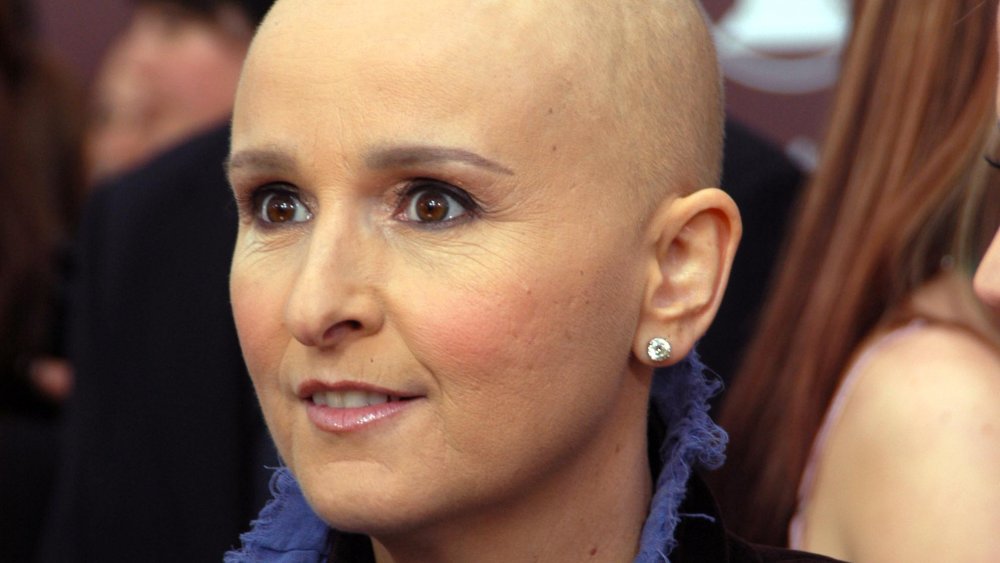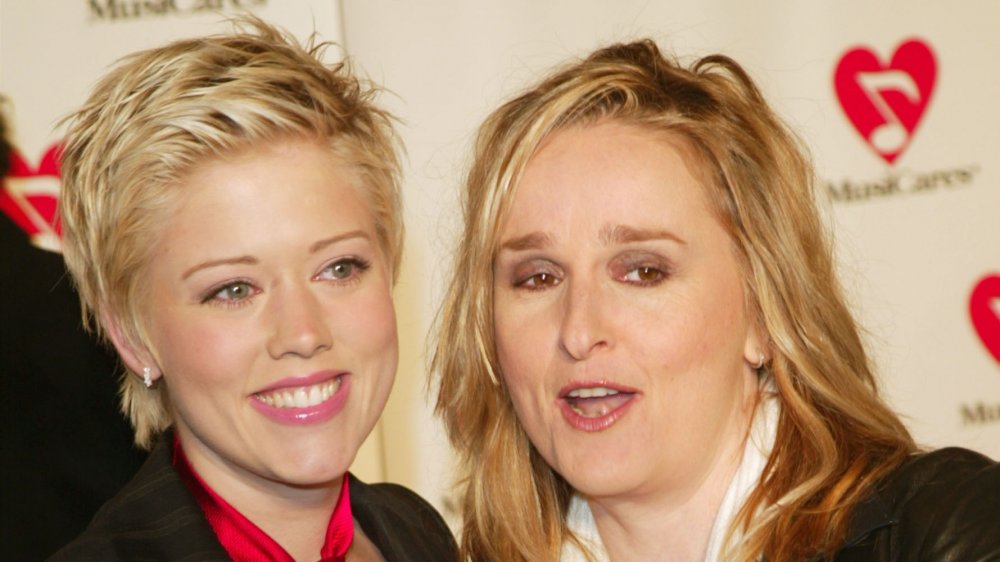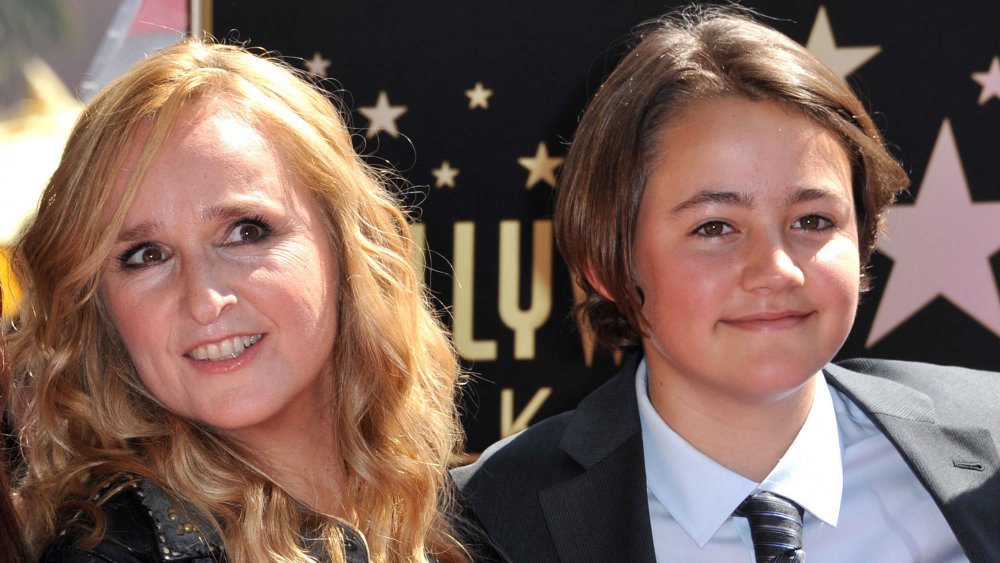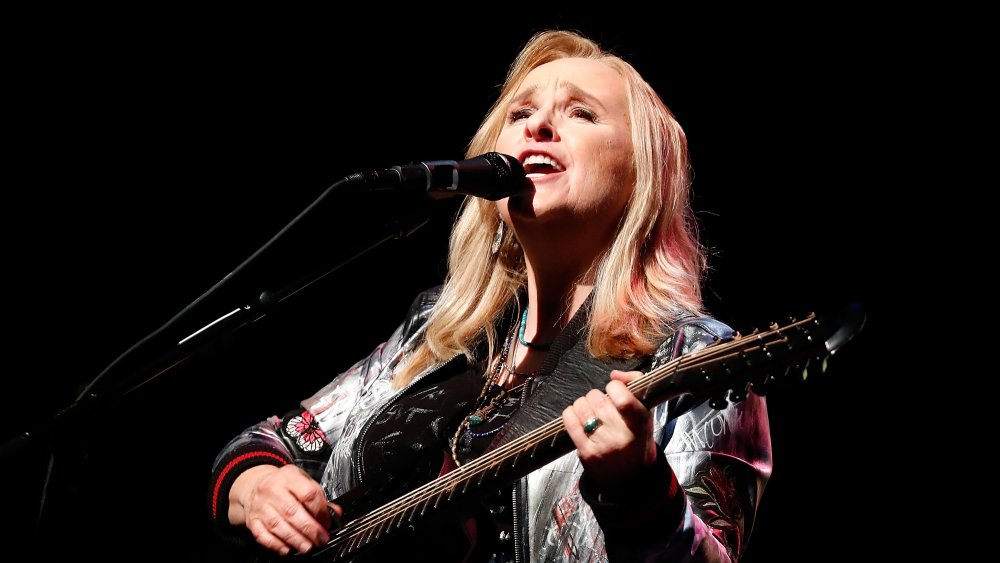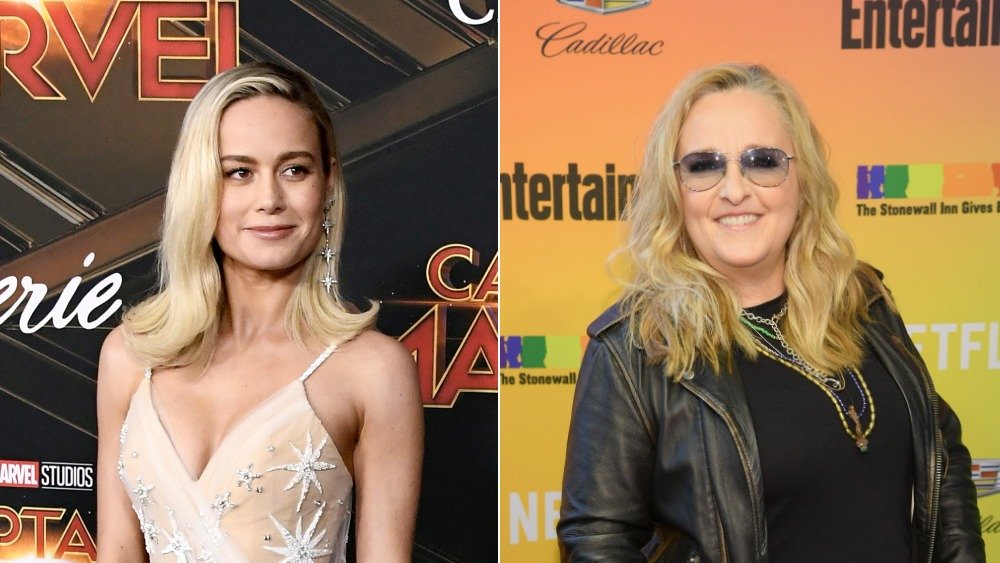The Tragic Real-Life Story Of Melissa Etheridge
After establishing herself as a well-known name on the underground rock scene during the late '80s, Melissa Etheridge shot to mainstream stardom with the release of her third album. 1992's Never Enough spawned the hit single "Ain't It Heavy," which earned the singer-songwriter her first Grammy — she triumphed in the Best Female Rock Vocal Performance category, and would do the same thing two years later with "Come To My Window," one of three big hits from her fourth LP, 1993's Yes I Am. Etheridge's fourth record remained in the album charts for the better part of three years and would ultimately go six times platinum. She became a genuine rock star, something she had dreamed about since leaving her small hometown in Kansas.
Melissa Etheridge initially headed to Boston to get an official musical education, but she soon moved on to Los Angeles in search of stardom, where she would get her big break. "I was discovered in a lesbian bar," she told Billboard in 2018. "I was very out. I was just, 'Don't ask, don't tell.'" Her managers might have been happy to simply ignore her sexuality, but the press was not. Rumors swirled for years prior to her coming out, and the topic would fill countless column inches when she eventually did confirm that she was a lesbian. She's been back in the headlines on a handful of occasions in the years since, and not always for positive reasons. Let's take a look at the tragic, real-life story of Melissa Etheridge.
Melissa Etheridge had to hide her homosexuality in her lyrics
1993's Yes I Am is widely regarded as Melissa Etheridge's coming out album, though that was never her plan. The rocker originally intended to wait until the record was on shelves before she told the wider world her secret, but it didn't pan out that way. "I decided that, when the album came out, I would come out on Arsenio Hall or something," she told Colorado Springs Indy. "But then I got involved in the Clinton/Gore campaign, and got invited to the big Gay Triangle Ball." Etheridge came out at the 1992 event, deciding to just go for it when she got caught up in the moment. "I walked up to the microphone and said, 'Hi, I'm real proud to say I'm a lesbian,'" she recalled (via The GLR). "It really startled everyone, including me."
When Yes I Am dropped the following year it went down extremely well with her fans, who all of a sudden heard new meaning in her lyrics. The truth, however, is that Melissa Etheridge had been majorly hinting at her sexuality in her music from the very beginning. "If you listen to my first album, it's very personal," she told the Pittsburgh Post Gazette in 1994. "Because I had to say 'I' and 'You' it became very direct — even in my first album, there's lines like, 'I've got Delilah in my hair' and... stuff like that was sort of blurry but it was open to interpretation."
Melissa Etheridge wasn't allowed to marry the person she loved
Two years after she came out, Melissa Etheridge took part in a joint interview with her then-girlfriend, filmmaker Julie Cypher. "On a spiritual level I believe that confronting the fear of coming out loosened up and freed all other aspects in my life," Etheridge told Advocate. "I just think that when you do that for yourself, when you stand up and say, 'This is what I am,' then good things come to you." Good things did come to Etheridge and Cypher (the latter gave birth to their two children, Bailey Jean and Beckett, via artificial insemination), but at the time they were not allowed to do the one thing that most couples in love did back then — get married.
When she sat down for another interview with Advocate in 2019, Melissa Etheridge recalled what life was like for gay people back when she was a youngster. "It was so hard in the '60s and the '70s, so hard," she said. "I used to say this 20 years ago when I would do interviews, when I came out, 25 years ago, I'd say that my children and my children's children, they're going to go, 'Really?' When I say, 'Yeah they wouldn't let us get married, they wouldn't let us—' It's going to seem weird to them. And it does." The musician went on to praise the hard work of all the dedicated LGBTQ activists who fought for equality before her.
Radio stations regularly discriminated against Melissa Etheridge
Being a lesbian in the music business has been complicated for Melissa Etheridge at times, but the truth is, even if she was straight, she would have still been at a huge disadvantage. Female rockers were seen as a novelty when she first started out, especially solo acts. "When I started we were taking my first record around to radio stations, they'd say 'Oh, I'm sorry, we can't play her, we're already playing a woman,'" Etheridge recalled during a 2019 interview with InFocusVisions. "But, y'know, it's still difficult. You have to work really, really hard. It's one of those last men's businesses, especially rock 'n' roll." It's not just the music industry that she wants to see change, either.
In 2007, Melissa Etheridge won an Oscar for her song "I Need To Wake Up," featured in Al Gore's global warming documentary, An Inconvenient Truth. She started working with Women in Film's New Music Committee when she realized that a woman winning an Academy Award in her field was a rarity. "It's ridiculous that of the top 500 films of last year, one percent had female composers," she told Hamptons in 2019. "It's just a part of the American culture, the American art, that has a blindside; that it doesn't even know that it's a boy's club." She's always happy to mentor young female musicians, but Etheridge believes that change has to come from the top — the singer-songwriter wants more execs to take chances on young women.
Melissa Etheridge's brave comeback from cancer brought the Grammys to tears
In 2004, Melissa Etheridge discovered a lump in her left breast that turned out to be cancer. Doctors removed a four-centimetre tumor and prescribed a mixture of radiation and chemotherapy, the latter of which pushed the musician to her limits. "Chemo was tough," she told Cancer Connect. "Physically, it was the worst thing I've ever been through." Etheridge lost her hair during her treatment, but she wouldn't let that stop her from doing the thing she loved most. She was right in the middle of her treatment when she learned she'd been nominated for another Grammy, so she wasn't sure if she'd be strong enough to make the ceremony. She was, and there wasn't a dry eye in the house when she took to the stage completely bald to belt out a cover of Janis Joplin's "Piece of My Heart."
Speaking to NBC, Melissa Etheridge said that she hoped her performance might "help somebody who's sitting on chemo laying in bed and going, 'God, I'm bald, isn't this weird?' Maybe it'll help them feel a little better." Her brave comeback actually inspired part of the original version of India Arie's "I Am Not My Hair," a collaboration with Pink. Arie told Billboard that she penned the third verse after watching Etheridge's comeback. "Her performance brought tears to my eyes," Arie said. "At that moment in time, her performance was a juxtaposition of pain and beauty. It symbolized the beauty of strength."
How Melissa Etheridge dealt with her depression
Melissa Etheridge suffered from bouts of depression when she was living with cancer, and the "horrible" side effects of her medication were not helping matters. She was losing weight and the pain was reaching unbearable levels, so she decided to try medical marijuana. It helped her to regain her appetite and ignited a new passion in her. "I believe deeply in the compassionate care of cannabis and plant medicines," she told The Revue. "I don't have to go out of my way to do it, [people] come to me and say, 'It's about to go to the floor in Illinois, can you call the senator?' You betcha' I will."
Etheridge admitted that she used marijuana recreationally before her diagnosis ("I'm a rock star, I'm in California, it's a lifestyle here,") but cancer made her view the plant in a new light. She never thought about using it as a medicine "until the effects of chemotherapy started wrecking my intestinal system," she revealed. "It can give me an appetite, and take the pain and depression away." When she started eating properly again, she made a conscious effort to only put good things into her body. "That's what cancer showed me," she told InFocusVisions in 2019. "I'm actually healthier and stronger than I was 15 years ago. Not only what I was eating, and how I treated my body, but what I was thinking. My thoughts were very depressing, and stressed, and I changed all that."
Melissa Etheridge was hurt and embarrassed following her divorce
Melissa Etheridge separated from her long-time partner Julie Cypher in 2000, announcing the split through her record label, Island Records. "With the utmost of love and respect for one another, we have decided to separate," a statement read. "As committed parents, our top priority continues to be what is in the best interest of our children." Three years later, Etheridge married actress Tammy Lynn Michaels, who gave her two more kids — Michaels had twins in 2006 after the couple decided to use a sperm bank. They went their separate ways in 2010, asking for "consideration and respect" for their family. They didn't get it.
Etheridge's personal life became fodder for the tabloids, especially when Michaels started slamming her in interviews — the rocker's ex accused her of ruining Christmas for their kids by failing to keep up with her child support payments. "I try to not pay attention to it," Etheridge said of all the tabloid attention during an interview with The Revue. "Sometimes, some of the nastier stuff, that hurts and I'm embarrassed mostly." The singer-songwriter became romantically involved with Nurse Jackie creator Linda Wallem after her divorce, and she was determined not to let any reporters get the inside scoop on her relationship this time around. "I'm definitely trying to stay out of the press because Linda is a very private person," Etheridge said. "She was my best friend for nine years, so it's an interesting relationship."
Melissa Etheridge's son died of an opioid overdose
In May 2020, Melissa Etheridge went through trauma that no parent should have to endure. In a heartbreaking Instagram post, the musician and activist revealed that her son, Beckett Cypher, had died of an opioid overdose. "Beckett, who was just 21, struggled to overcome his addiction and finally succumbed to it today," Etheridge said. "He will be missed by those who loved him, his family and friends. [...] We struggle with what else we could have done to save him, and in the end we know he is out of the pain now." Etheridge thanked everyone who had reached out to her and announced that she would return to singing soon. "It has always healed me."
After news of Beckett's passing broke, his biological father spoke out. When Melissa Etheridge and partner-at-the-time Julie Cypher decided they wanted kids, they turned to friend and rock legend, David Crosby. "For one, he's musical, which means a lot to me, you know, and I admire his work," Etheridge told Rolling Stone back in 2000. She kept the identity of her children's dad secret for a long time (both Bruce Springsteen and Brad Pitt were rumored to have been the donor at different stages) and Crosby was never directly involved in their upbringing, but he definitely wasn't just some stranger to them. In a now-deleted tweet (via ExtraTV), one Twitter user suggested that Crosby's only real contribution was his sperm, to which he bluntly replied: "Not true."
The Pulse nightclub tragedy devastated Melissa Etheridge
In June 2016, ISIS follower Omar Mateen opened fire at gay Orlando nightclub Pulse, killing 49 people in the deadliest terror attack on American soil since 9/11. "He had an automatic rifle, so nobody stood a chance," Jackie Smith, who witnessed two of her friends getting shot by the American-born Mateen, told the BBC. "I just tried to get out of there." The shocking mass shooting rocked the LGBTQ community and outraged the wider world. Melissa Etheridge, it appears, took the senseless murders really hard. She told Rolling Stone that she was dealing with the shooting in the way that she always deals with tragedy — by writing a song.
"That's how I first started to cope," she said. "I feel called to speak; to do what musicians do. We've been the town criers for hundreds of years. We're mirrors of society. We want to try to make sense. We want to try to heal. We want to bring some meaning, some purpose. We also want to put it down forever in history. That's how I'm coping." She named the track "Pulse" as a tribute to those who lost their lives, telling the music mag that there was "something very poetic and very meaningful about the name." One of the women killed at the club, Kimberly Morris, was actually due to attend one of Melissa Etheridge's upcoming shows in Connecticut. According to Billboard, Etheridge performed "Pulse" at said show and dedicated it to Morris.
Captain Marvel gave Melissa Etheridge hope
Melissa Etheridge has been trying to get the music and movie industries to become more inclusive when it comes to women for a number of years now, to limited success. In 2019, a BBC study revealed that the ratio of men to women featured on the previous year's biggest hit songs was three to one and that the gender gap had actually widened over the past decade. According to Etheridge, there's still light at the end of the tunnel. "It's funny because as I have aged this industry has changed," she told Advocate. "I think that my music gets more interesting as our society gets more comfortable with female role models."
When it comes to films, things seem a lot brighter. The Harvey Weinstein scandal and the Me Too movement forced Hollywood to implement major changes in terms of gender parity, and the results of that are already starting to filter through, especially when it comes to the ever-popular superhero genre. "Last night I took the kids to see Captain Marvel," Etheridge said. "Oh my God. So I'm watching that going, 'Finally, it won't be so weird to look up on stage and see a female rock star.'" She went on to praise the way that women have "come to the forefront in great strength" in recent years, adding that she does not see her age as a barrier to success anymore. "I look at it as, 'Oh, it's my time. Here I go.'"

